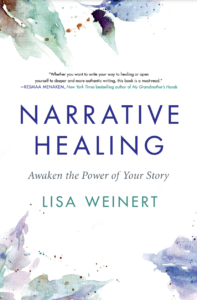Fordham M.S.W. student Lisa Weinert believes Western culture doesn’t appreciate the body enough. In a rise-and-grind world, we treat our bodies as things to tolerate—hunched over a desk, moving from project to project, only noticing when something goes wrong, forcing a doctor visit. Our sophisticated organism is reduced to a mere vessel for task completion.
She began Narrative Healing, a mind-body writing community that offers individual and group coaching, workshops, and listening circles to “help writers (re) connect with their bodies, develop a sustainable writing practice to heal from trauma, and share their stories in the world.”
She has come to Fordham to earn her M.S.W. and get clinical expertise to enhance her programs. She wants to create a bigger, more meaningful impact on those seeking help.
“I looked around at the people I admire most in the world…and they all had this degree,” she said. “And I was like, ‘this seems to be something I need to do.’”
A Born Storyteller
From a young age, Weinert’s dream was to become a writer. A born-and-raised New Yorker, she comes from a family of storytellers, which left an impression on her.
“I always knew I was a writer,” Weinert said. “I always turned to writing as a way to make sense of the world around me.”
The act of writing became therapeutic, Weinert said. It gave her an outlet to articulate her thoughts and feelings, work through chaotic times, and discover who she was emotionally.
“I’m a particularly sensitive person, and I had a sense that my skin was sort of inside out,” Weinert said. “Writing [allowed me]to translate and understand really big emotions I was having.”
It was no surprise, then, when she worked in publishing as an adult. Weinert began her writing career at the Nation Magazine before accepting a publicist position at Vintage/Achor Books, an imprint of Knopf Doubleday at Penguin Randomhouse, Inc. This is where Weinert “cut her teeth” in the publishing world, she said—and also thrived: promoted nine times in eight years, Weinert was the first publicist in Knopf’s history to become an editor.
“I experienced this Harvard education in publishing, and I got to work with incredible people,” Weinert said. “It was a phenomenal experience.”
In her personal life, Weinert was a “mover.” A member of multiple sports teams as a child, her passion for movement continued into adulthood through a regular yoga practice. Weinert said she had kept these physical practices separate from her publishing and storytelling work. A medical diagnosis changed that forever.
“I thought that writing came from my mind and was the important work of the world, and my body was essentially there to take me places and tolerate when it wasn’t really well,” she said “And about ten years ago, I had an acute medical crisis that really changed my life.”
Regaining Her Voice
Weinert had left Vintage/Achor Books and was working at a digital startup as a publishing consultant when she received a medical diagnosis that caused her whole world to halt. Although the situation eventually ended up being a misdiagnosis, the impact and trauma it left lasted.
“My body was caught up in fight, flight, or freeze—and in this particular environment, it was with medical voices, but you could replace that with any other kind of system of oppression,” Weinert said. “I felt powerless in a really big way. I had no access to my voice.”
It caused her to reassess the kind of storytelling she was doing, and the viewpoint with which she saw her body and physical health. Weinert leaned into her yoga and mindfulness practice like never before, becoming certified in therapeutic, restorative, and trauma-informed yoga as well as mindfulness meditation. She began teaching and studying with master practitioners, and the knowledge she gained helped Weinert combine the physical and writing practices she’d kept separate for so long.
“I started to learn from people who were talking about storytelling in a different way, and they were talking about how your body holds your stories,” she said. “I had these skills in a Western form of telling stories, and I started to tap into more somatic experiences—internal, instinctive, embodied approaches to how we connect to the stories within.”
This is how Weinert came to create Narrative Healing, her mind-body writing program. She began by teaching a course at Wesleyan University of the same name and organizing a conference at the Kirpalu Center for Yoga and Health in Stockbridge, Massachusets.
Narrative Healing
Over the next six years, Narrative Healing took shape—and as the demand for her services increased, Weinert transitioned into running the program full-time. She described the content of Narrative Healing workshops and retreats as a “rotating combination of mindfulness, practice, or breathwork followed by creative practice,” all designed to be done at a desk—the ultimate practicality for the working person.
“I’m looking at the desk environment as a potential studio of sorts,” she said. “I’m hoping to approach this in the same way you might approach a yoga class or a meditation class or going to the gym. Just another thing to add to your bag of tricks that might make you feel better.”
Weinert’s workshops continued to grow, and her coaching sessions multiplied exponentially. There was a need for this work, this connection between mind and body—and she was there to meet it. Being only one of her to go around, it was difficult to meet all that demand. What came next was a lifelong passion realized.
 Weinert returned to the publishing world—but this time, she is on the writers’ side of the table. Hachette Go released her new book Narrative Healing: A Mind-Body Approach to Awakening the Healing Power of Your Story in July 2023. The book has already received acclaim from New York Times bestselling authors. It draws upon her twenty years of experience to “offer a new paradigm for personal growth, self-care, and community action through an embodied writing practice.”
Weinert returned to the publishing world—but this time, she is on the writers’ side of the table. Hachette Go released her new book Narrative Healing: A Mind-Body Approach to Awakening the Healing Power of Your Story in July 2023. The book has already received acclaim from New York Times bestselling authors. It draws upon her twenty years of experience to “offer a new paradigm for personal growth, self-care, and community action through an embodied writing practice.”
“You could be interviewing little Lisa at age eight, and I would tell you that my dream was to write a book,” she said. “I started focusing on other people’s stories before coming back to my own, but when the book came out, it was really a lifelong dream.”
Pursuing Clinical Knowledge to Enhance Her Practice
In the fall, Weinert’s personal journey and business were flourishing. She was an entrepreneur with a thriving program, an in-demand speaker, and a published author. Most people would probably say, if it ain’t broke, don’t fix it. But then came another need.
As coaching and workshop requests filed in, Weinert noticed a pattern — more and more of them were trauma-related. Those who sought out her workshops weren’t just people who needed to de-stress from everyday living; they were people suffering from trauma and looking for help coping.
“I saw very clearly that this was a mental health offering and that I was in over my head,” she said. “I felt like I needed not just more skills; I felt like I needed colleagues. I was going and doing these workshops and then coming home, and I’d have to lie on the floor for an hour.”
Weinert was desperate for her own support system—professional colleagues who could relate to the result of absorbing others’ traumas. A community that understood what she was going through.
Lisa had an epiphany while facilitating a workshop for gun violence survivors with Abby Hurst, LMSW, Director of Trauma-Informed Programs at Everytown for Gun Safety. Their collaboration left Weinert energized and hungry for the skills Hurst brought to the workshop.
“She had a very specific lens that she was working with,” Weinert said. “I felt like I either wanted to work with Abby on everything I do, or I wanted to learn what Abby’s doing.”
Weinert is now in her first semester as a part-time student in GSS’s M.S.W. program, taking her coursework from the Lincoln Center campus. And although she has already connected with professors like Dr. Derek Tice-Brown, who conducts scholarly research in yoga therapy and related disciplines, she is open to a holistic learning experience. She wants to take in everything this diverse career path has to offer.
“Fordham has an incredible history of social justice and incredible scholars,” she said. “I’m completely open to my mind being blown.”
Most importantly, though, Weinert recognizes the global mental health crisis and knows there is a need for credentialed practitioners.
“I don’t think we have a lot of room in this world for people who are making it up as they go,” she said. “People are suffering tremendously. Studies show over 70 percent of Americans are living with trauma …and I saw it in my workshops. I want to offer people the care that they deserve.”
Weinert is offering exclusive access for GSS Community members to access her online class Labs. Labs is a mindfulness and somatic-based writing class that offers meaningful opportunities to relax, release, build resilience, build confidence, and foster expression. GSS Community members can learn more about Labs here and use this one-time link to access a class for free.
Additionally, GSS Community members can access an excerpt of Weinert’s book, Narrative Healing, using this link.



